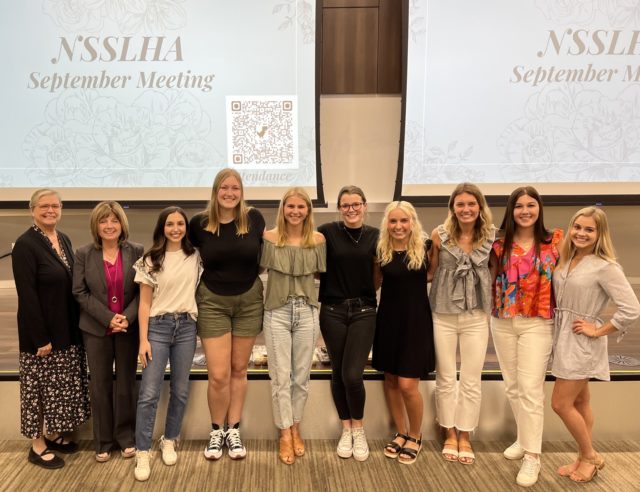By Mariah Bennett | Staff Writer
Baylor’s chapter of the National Student Speech-Language-Hearing Association (NSSLHA) will be hosting its annual national fall conference in person for the first time since the onset of COVID-19. It will be from 8 a.m. to 4 p.m. Friday in Cashion 506.
According to the event’s flyer, the Department of Communication Sciences and Disorders, along with support from the Robbins College of Health and Human Sciences, will be hosting the conference.
Registration is free for Baylor students as well as families with children with communication disorders, while professionals must pay $75 to register. To pay, attendees may use Venmo or mail directly to the association. As of Sept. 21, there are 277 attendees registered.
The event will include graduate and undergraduate students, faculty and general speech language pathologists.
According to Dr. Carrie Drew — clinical faculty member, supervisor and senior lecturer in the Department of Communication Sciences and Disorders — invitations to the conference are sent nationally.
Robinson senior and NSSLHA president Hope Caviness said the conference is for anyone who wants to attend and is not exclusively for students studying communication sciences and disorders.
Caviness said NSSLHA was in charge of choosing a topic for the conference, ultimately deciding on “Social Communication Interventions for Autism.” She also said her team had to book a room, send out flyers and handle registration. Additionally, Caviness said NSSLHA was able to invite a well-known and well-rounded speaker — Dr. Connie Kasari — who she said is brilliant regarding the topic of autism spectrum disorder.
Drew said they decided to focus on autism for the conference this year because of the recent autism spectrum disorder expansion.
“We have a new preschool and a toddler class for children with autism,” Drew said. “They work on speech, language skills, feeding, social skills, all of those things … It’s called the [Mary Jo] Robbins Clinic for Autism.”
Kasari is a leading international expert in developing interventions for children with autism spectrum disorder and their families. She is also a professor of psychiatry at the David Geffen School of Medicine at the University of California, Los Angeles.
Caviness said the conference will contain a combination of activities and speeches.
“We’ve done paper cut-outs before, communication boards … and different activities that you can bring into the classroom with [autism spectrum diosorder] students,” Caviness said.
The conference will include a welcome, opening remarks, five modules and a closing Q&A portion.
Three of the five modules will focus on the JASPER method — a treatment approach developed by Kasari based on a combination of developmental and behavioral principles. JASPER is an acronym that stands for joint attention, symbolic play, engagement and regulation. The method has been tested for the past 15 years in randomized controlled trials involving nearly 500 children with autism spectrum disorder.
The other two modules will focus on an introduction to early social communication differences with autism spectrum disorder and the transition to school.
Caviness said the conference is a good opportunity to learn about different communication interventions for people with autism spectrum disorder.
“People with [autism spectrum disorder] are obviously in this world; they’re amazing,” Caviness said. “And you want to be able to treat everyone the exact same no matter who you’re encountering. Everyone can benefit from it.”



